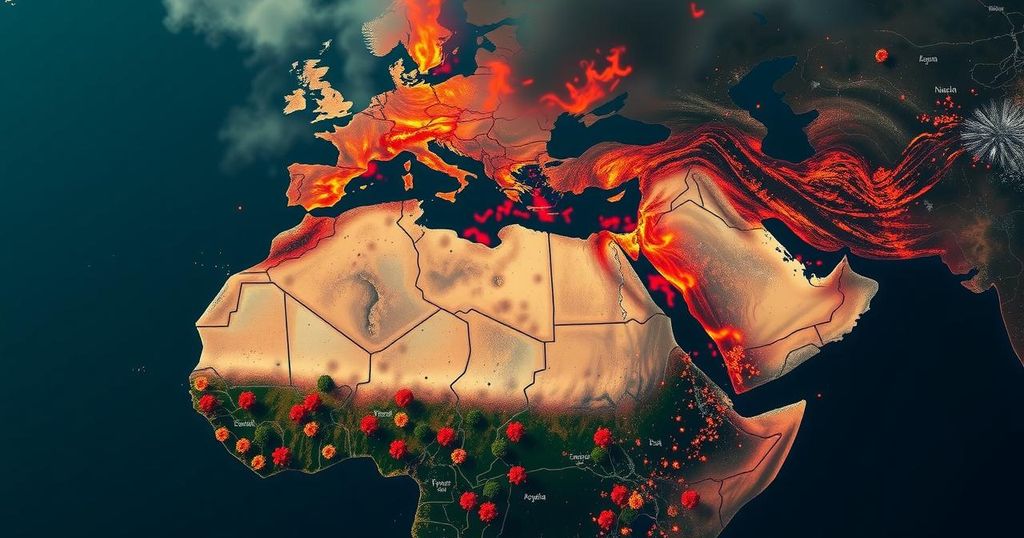Escalating Tensions in the Horn of Africa: A Call for Urgent Diplomatic Attention
The Horn of Africa is facing rising tensions as Ethiopian Prime Minister Abiy Ahmed navigates contentious regional dynamics, seeking Red Sea access amidst unresolved conflicts from the Tigray crisis. External nations have intensified their involvement in the region, raising the stakes for a potential conflict with global implications. The U.S. must prioritize diplomatic efforts to de-escalate the situation amid significant humanitarian concerns in neighboring Sudan and Somalia.
Tensions are once again escalating in the Horn of Africa, as the region faces an intricate mix of conflicts and historical rivalries. Following a devastating war that erupted in November 2020 between the Ethiopian government and the Tigray region, a tenuous peace was established through a cessation of hostilities agreement in 2022. However, significant issues remain unresolved, including the urgent need to facilitate the return of displaced individuals. Additionally, the coalition originally formed by Ethiopian Prime Minister Abiy Ahmed to address the Tigray crisis has now fractured, leading to ongoing civil unrest in both the Amhara and Oromia regions. As the United States prepares for another presidential election, it risks neglecting the escalating tensions in this critical part of Africa. Prime Minister Abiy Ahmed’s ambition to secure access to the Red Sea and his inclination to engage in risky geopolitical maneuvers have provoked neighboring countries. Notably, his negotiations with Somaliland—a self-governing entity seeking independence—exacerbated Ethiopia’s historically complex relationship with Somalia. At the same time, Egypt has intensified its support for Somalia as a countermeasure to the Grand Ethiopian Renaissance Dam, which threatens its water supply from the Nile. Eritrea has taken advantage of this environment, aligning with Egypt and Somalia to fortify its own interests in regional instability. Furthermore, non-African nations with vested interests in trade routes through the Red Sea and the Gulf of Aden are becoming increasingly involved. Turkey has strengthened its rapport with Somalia, while the United Arab Emirates maintains a close relationship with the Ethiopian government. The intricate dynamics in the region heighten the risk of miscalculations that could lead to wider conflicts, which would inevitably lead to humanitarian crises and destabilize global economic interests, particularly in commercially significant shipping lanes. The impact of such conflicts would not only be borne by the local population but also resonate across the international community, including increased refugee flows. Aside from the escalating tensions in Ethiopia, other serious conflicts in the region warrant urgent attention. The civil war in Sudan, characterized by extreme violence, has been largely overlooked, although it represents one of the worst humanitarian crises worldwide. Meanwhile, Somalia’s ongoing instability provides fertile ground for groups like al-Shabaab to strengthen their influence, raising fears of deeper connections with Yemen’s Houthi militants. Despite the competing demands of domestic politics, it is imperative for the United States to prioritize efforts aimed at de-escalation, to deter proxy conflicts, and to avert further humanitarian disasters in the Horn of Africa.
The Horn of Africa has long been a region of significant geopolitical tension, marked by historical rivalries, ethnic conflicts, and the strategic importance of its waterways. The recent history of civil war in Ethiopia, especially the conflict involving the Tigray region, has drawn international attention due to its severe humanitarian consequences. A fragile peace was established in 2022, yet the region remains vulnerable to renewed conflicts, driven by unresolved issues and the ambitions of regional powers seeking to expand their influence. Additionally, the involvement of external entities such as Egypt, Turkey, and the United Arab Emirates complicates the already volatile situation.
In summary, the Horn of Africa is once again on the brink of heightened tensions, driven by regional disputes and the ambitions of leader Abiy Ahmed. While the United States faces domestic distractions, the urgent need to prevent escalating conflicts in this strategically vital region must be prioritized. The international community must remain vigilant and proactive in addressing these crises to safeguard not only African lives but also global economic stability.
Original Source: www.cfr.org




Post Comment